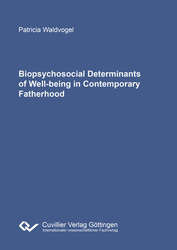| Fachbereiche | |
|---|---|
| Buchreihen (97) |
1381
|
| Nachhaltigkeit |
3
|
| Gesundheitswesen |
1
|
| Geisteswissenschaften |
2370
|
| Medienwissenschaften | 16 |
| Theologie | 57 |
| Philosophie | 102 |
| Rechtswissenschaft | 423 |
| Wirtschaftswissenschaften | 852 |
| Sozialwissenschaften | 417 |
| Sportwissenschaften | 48 |
| Psychologie | 233 |
| Pädagogik | 190 |
| Geschichtswissenschaften | 183 |
| Kunstwissenschaften | 111 |
| Kulturwissenschaften | 166 |
| Literaturwissenschaften | 117 |
| Sprachwissenschaften | 88 |
| Naturwissenschaften |
5407
|
| Ingenieurwissenschaften |
1798
|
| Allgemein |
98
|
|
Leitlinien Unfallchirurgie
5. Auflage bestellen |
|
Erweiterte Suche
Biopsychosocial Determinants of Well-being in Contemporary Fatherhood
Patricia Waldvogel (Autor)Vorschau
Leseprobe, PDF (57 KB)
Inhaltsverzeichnis, PDF (64 KB)
The aim of the present thesis was to increase knowledge about the predictors for a fulfilling fatherhood across different contexts of contemporary fatherhood. Two empirical studies were conducted to investigate the consequences of different family constellations for paternal psychological well-being, and the role of testosterone for paternal role satisfaction. In the first study, findings demonstrated that fathers living in stable two-parent families with biological children had the highest level of psychological well-being when compared to fathers with other family forms. By contrast, a history of family separation in separated biological fathers and blended-family fathers, and the concomitant loss of father-child contact, seemed to be particularly disadvantageous for paternal well-being. Shared living arrangements, regular contact with biological children, or forming a new intact family could protect these fathers from negative outcomes. In the second study, findings demonstrated that testosterone levels were positively related to perceived constraint due to fatherhood in fathers with young children. These findings suggested that high testosterone levels could be contradictory to paternal role satisfaction, while low testosterone may buffer some of the constraining aspects of caring for young children. In conclusion, the findings presented in the present thesis emphasize the importance of considering contextual as well as biopsychological factors to generate a comprehensive understanding of the well-being of fathers in its different facets.
| ISBN-13 (Printausgabe) | 9783736994577 |
| ISBN-13 (E-Book) | 9783736984578 |
| Buchendformat | A5 |
| Sprache | Englisch |
| Seitenanzahl | 134 |
| Umschlagkaschierung | glänzend |
| Auflage | 1. Aufl. |
| Erscheinungsort | Göttingen |
| Promotionsort | Zürich |
| Erscheinungsdatum | 19.01.2017 |
| Allgemeine Einordnung | Dissertation |
| Fachbereiche |
Psychologie
|
| Schlagwörter | fatherhood, psycological well-being, family structure, parental involvement, non-residential parenting, role statisfaction, testosterone, parental care |








